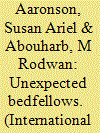| Srl | Item |
| 1 |
ID:
074822


|
|
|
|
|
| Publication |
2006.
|
| Summary/Abstract |
Does the implementation of a World Bank structural adjustment agreement (SAA) increase or decrease government respect for human rights? Neoliberal theory suggests that SAAs improve economic performance, generating better human rights practices. Critics contend that the implementation of structural adjustment conditions causes hardships and higher levels of domestic conflict, increasing the likelihood that regimes will use repression. Bivariate probit models are used to account for World Bank loan selection criteria when estimating the human rights consequences of structural adjustment. Using a global, comparative analysis for the 1981-2000 period, we examine the effects of structural adjustment on government respect for citizens' rights to freedom from torture, political imprisonment, extra-judicial killing, and disappearances. The findings show that World Bank SAAs worsen government respect for physical integrity rights.
|
|
|
|
|
|
|
|
|
|
|
|
|
|
|
|
| 2 |
ID:
107809


|
|
|
|
|
| Publication |
2011.
|
| Summary/Abstract |
The WTO system and democratic rights are unexpected bedfellows. The GATT/WTO requires governments to adopt policies that provide foreign products (read producers) with due process, political participation, and information rights related to trade policymaking. Because these nations also provide these rights to their citizens, a growing number of people are learning how to influence trade-related policies. As trade today encompasses many areas of governance, these same citizens may gradually transfer the skills learned from influencing trade policies to other public issues. Thus, the WTO not only empowers foreign market actors, but also citizens in repressive states. We use both qualitative and quantitative analysis to examine whether membership in the WTO over time leads to improvements in these democratic rights. Our qualitative analysis shows that these issues are discussed during accessions and trade policy reviews. Quantitative analysis examines how members of the GATT/WTO perform on these democratic rights over time. We use a cross-national time series design of all countries, accounting for selection issues of why countries become members of the GATT/WTO regime. We find that longer GATT/WTO membership leads to stronger performance on our metrics for political participation, free and fair elections, and access to information.
|
|
|
|
|
|
|
|
|
|
|
|
|
|
|
|